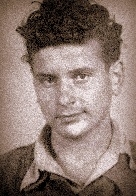I learned to be grateful even for the things I didn´t like

Download image
Ludvík Florián was born on November 10th of 1936 in Brno. He grew up in the village of Křenovice as the only child in the family. His father used to work at the railroad but at the time his son was born he had already retired after a serious work injury. In the early 50s, the village of Křenovice served as a base for the SODAN resistance group, founded initially by local Boyscout members to oppose the collectivisation in its beginning. Ludvík Florian had become one of the active members. At the beginning, the group would send threatening letters to local officials and they would also print and distribute leaflets. Later, they begun to organise and also to perform the acts of sabotage to oppose the brutal measures taken against local landowners. But most of all, these young resistance fighters had been striving for the Communist regime to be destroyed and for democracy to be reestablished. In 1953, the group had been given away and its members including Ludvík Florián were arrested. He had been interrogated at the Secret Police office in Příčná Street in Brno. After the authorities refused to allow him to meet his father at prison during the investigation, in a desperate situation, he decided to hold a hunger strike protest. After he lost consciousness, he was transferred to a prison hospital in Praha-Bohnice. After that, as a juvenile, he was sentenced to four years and six months in prison and after the trial, he had been transferred to the Vykmanov labour camp. Later he went to the Mariánská camp and after that, he spent most of his sentence in Rovnost (Equality) I. camp. There, he witnessed how political prisoners were being abused and often even tortured. For the whole time, he had been working as a stone-breaker in the uranium mines, in extremely demanding conditions and without any protective gear. He left the camps as a twenty-year old. As a politically unreliable person he hadn´t been allowed to resume his studies. So after his compulsory military service, he had to work as a digger, a miner, and after that as a coal depot employee. He raised eleven children, six whom he had fathered and five whom he adopted. At present, as a pensioner, he has been living in Ostrov nad Ohří with his wife.
